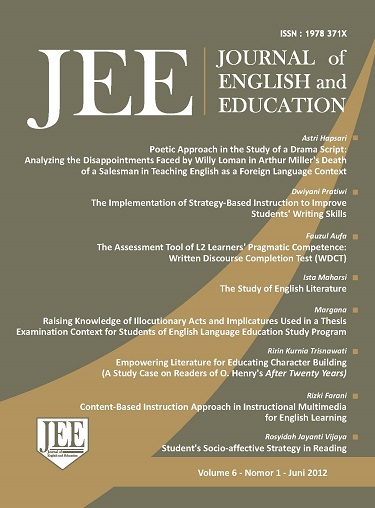Main Article Content
Abstract
This paper deals with raising knowledge of the illocutionary acts and implied meanings for students of English education study program. It aims to describe the types of illocutionary acts, illocutionary forces, and conversational implicatures used in the thesis examination. Such types of knowledge should be well understood as the knowledge confers a clear description of the use of speech acts in the thesis examination. More specifically, students of English education study programs should be aware of the types of illocutionary acts, namely representatives, directives, commissive, expressive, and declarative which are further classified according to the illocutionary forces of each illocutionary act. Added to this, the knowledge of conversational implicatures: generalised conversational implicatures and particularised conversational implicature are also of great importance to minimise mis-conception and mis-interpretation of speech acts which possible occur in the thesis examination practices.
Key words: illocutionary acts illocutionary forces implicatures
Article Details
Copyright (c) 2016 Journal of English and Education

This work is licensed under a Creative Commons Attribution-ShareAlike 4.0 International License.
Authors who publish with this journal agree to the following terms:
- Authors retain copyright and grant the journal right of first publication with the work simultaneously licensed under a Creative Commons Attribution-ShareAlike 4.0 International License that allows others to share the work with an acknowledgment of the work's authorship and initial publication in this journal.
- Authors are able to enter into separate, additional contractual arrangements for the non-exclusive distribution of the journal's published version of the work (e.g., post it to an institutional repository or publish it in a book), with an acknowledgment of its initial publication in this journal.
- Authors are permitted and encouraged to post their work online (e.g., in institutional repositories or on their website) prior to and during the submission process, as it can lead to productive exchanges, as well as earlier and greater citation of published work (See The Effect of Open Access).

